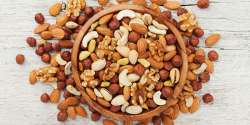Eating almonds, peanuts may boost colon cancer survival
Nuts like almonds, peanuts, walnuts can directly help in reducing the risk of cancer recurrence.

People with colon cancer who regularly eat nuts such as almonds, walnuts, hazelnuts, cashews and peanuts may be at significantly lower risk of cancer recurrence and mortality, researchers said.
The findings showed that those who regularly consumed at least two, one-ounce servings of nuts each week showed a 42 per cent improvement in disease-free survival and a 57 per cent improvement in overall survival.
In patients with stage III colon cancer, recurrence was reduced by nearly half.
"These findings are in keeping with several other observational studies that indicate that a slew of healthy behaviours, including increased physical activity, keeping a healthy weight, and lower intake of sugar and sweetened beverages, improve colon cancer outcomes," said lead author Temidayo Fadelu, postdoctoral student at Dana-Farber Cancer Institute in Boston.
"The results highlight the importance of emphasising dietary and life-style factors in colon cancer survivorship," Fadelu added.
The study, published in the Journal of Clinical Oncology, followed 826 participants in a clinical trial for a median of 6.5 years after they were treated with surgery and chemotherapy.
Patients may not be eating nuts due to concerns about the high fat content and that increasing nut consumption will lead to obesity, which leads to worse outcomes.
On the contrary, "our studies, and across the scientific literature in general, have found regular consumers of nuts tend to be leaner", explained Charles S. Fuchs, Director at Yale Cancer Centre in the US.
Many previous studies have reported that nuts also help to reduce insulin resistance.
"These studies support the hypothesis that behaviours that make you less insulin resistant, including eating nuts, seem to improve outcomes in colon cancer," Fuchs said. Nuts also might play a positive role by satisfying hunger with less intake of carbohydrates or other foods associated with poor outcomes, Fuchs noted.
(With IANS Inputs)